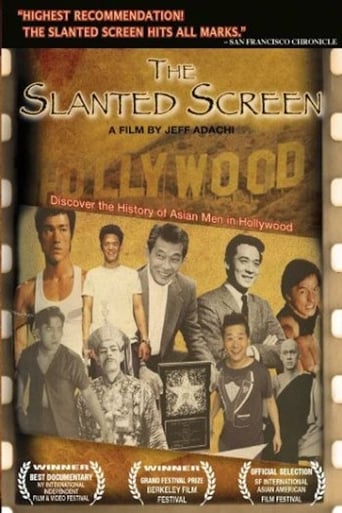gavin6942
From silent film star Sessue Hayakawa to "Harold and Kumar Go to White Castle", the Slanted Screen examines the portrayal Asian men in film and television, and how new filmmakers are now re-defining age-old stereotypes.This documentary opened my eyes a bit, as I was not even familiar with the work of silent star Sessue Hayakawa. In fact, it never even occurred to me how much the Asian community was excluded from Hollywood.So, Bruce Lee was the "James Dean" of the Asian community? I can see that. For years, there were whites playing Asians (typically nasty, villainous Asians) and even today racism against Asian stereotypes is more tolerated and "acceptable" than against other targets.
zeidmanart
This film is well-written and directed. In between recent interviews of Asian American male actors, writers, directors and critics, is interspersed archival footage showing the roller-coaster ride of these actors. While Sessue Hayakawa, film star and romantic lead, drew big and mixed audiences, others toiled in unfavorable type casting and stereo type. The exclusion laws and World War II took their toll and set back Asian American progress in the film industry. Even worse was the use of non-Asian men in makeup to appear Asian, big in the 30s. Don't miss the discussion panel in the extra features. I think that the interview with James Shigeta is the most informative. All taken, this is a fascinating film.
MartinHafer
Unless you are a total jerk, it's hard to watch "The Slanted Screen" without a feeling of sadness. After all, for the most part, Asian parts in American films have been very, very limited. Either, in the old days, they were portrayed in very stereotypical terms by Westerners (such as Charlie Chan and Mr. Moto) or today they have been mostly absent or portray nice geeky folks or kung fu heroes. Asians playing PEOPLE--that has been a serious omission in films. So, as you hear many Asian actors and filmmakers talking about these limitations you can't help but feel for them. Fortunately, things have been getting better...to a point. I was surprised to see that audiences responded poorly even in recent years, for example, to a scene where the Asian hero kissed the non-Asian heroine--so they completely eliminated the romantic aspects of the film--yet it was "Romeo Must Die"--which was based on "Romeo and Juliet"! How can they de-sexualize this plot in order not to 'offend'?! Why is this acceptable but not acceptable if the characters were bi-racial with one white and the other black? A good question--and something you can't help but think as you watch these folks talk about the history of Asians in films and Asians in films today. The film is shown using film clips and lots of interviews and makes its point well. Worth seeing and thought-provoking---even if it is a bit depressing.
Michael_Elliott
Slanted Screen, The (2006) **** (out of 4) Extremely well-made documentary that takes a look at how Asians were shown in movies and TV. The film goes all the way back to the silent films of Sessue Hayakawa up to current films like Romeo Must Die. We gets clips from various white actors including Christopher Lee, Lon Chaney, Boris Karloff, Peter Lorre, Mickey Rooney and Bela Lugosi playing Asian characters and how these stereotypes caused studios not to hire Asian actors. We also get a rather heated debate on if Bruce Lee was good or bad for the Asian community. The film runs just under an hour and while I think the movie could have been improved with a longer running time, the director does a great job at tackling a lot of subjects within the running time. Mako, Jason Scott Lee, James Shigeta, Dustin Nguyen are among the actors interviewed and all of them tell some very strong stories of what it was like seeing whites playing Asian characters. A Hollywood insider said Asians keep getting bad roles simply because whites and blacks don't want to see them on the screen with bigger roles. This was true in the silent days and continue today so hearing someone actually say it is rather refreshing.


 AD
AD


